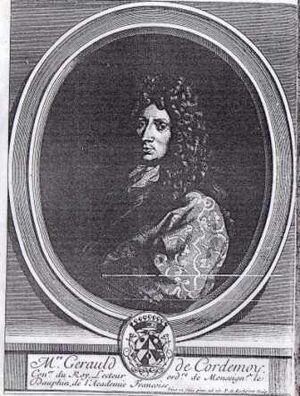Géraud de Cordemoy facts for kids
Géraud de Cordemoy (born October 6, 1626 – died October 15, 1684) was a French philosopher, historian, and lawyer. He is best known for his ideas about how the world works (called metaphysics) and his thoughts on language.
Contents
About Géraud de Cordemoy
Géraud de Cordemoy came from an old noble family in France. He was born and died in Paris. He was the third of four children. His father, also named Géraud de Cordemoy, was a teacher at the University of Paris. Sadly, his father passed away when Géraud was only nine years old.
Géraud de Cordemoy became a private tutor and a linguist, someone who studies language. He also worked as a lawyer. He spent time with other thinkers in Paris. He met famous people like Emmanuel Maignan and Jacques Rohault.
He was a good friend and student of Bossuet, who also admired another great thinker, Descartes. Because of this, Géraud de Cordemoy was chosen to be a tutor for the Dauphin, who was the son of King Louis XIV. In 1675, he was elected to the Académie française, a very important French group that focuses on the French language.
Cordemoy's Ideas
Cordemoy is famous for changing some of Descartes' ideas about how things cause other things to happen. He introduced the idea of "occasional cause." This means that while our will might seem to cause something, like moving our arm, God is the true cause. Our will just creates the "occasion" for God to act.
For example, when you want to move your arm, your desire is the "occasional cause." But God is the one who actually makes your arm move. Cordemoy believed this was true for everything in the universe. God is the real and main cause of all movement. This idea is called "occasionalism."
Body and Soul
Cordemoy also thought a lot about the body and the soul. He believed they are completely different. He said that the body is made of tiny, indivisible parts. He didn't use the word "atom," but his ideas were similar to those who believed in atoms.
In his book Le discernement du corps et de l’âme (which means "Discrimination between body and soul"), he wrote about these ideas. Some followers of Descartes didn't agree with him at the time.
Language and Thought
In another important book, Discours physique de la parole (which means "Physical Discourse on Speech"), Cordemoy asked a big question: "How can I be sure that other people around me are also thinking beings, and not just like robots?"
He believed the answer was through language. He thought that language is how we share our thoughts. It helps us know that other people have a soul and can think, just like us.
Cordemoy also said that there's no real connection between a word (the sound or sign) and the idea it represents. He thought that if souls could communicate directly, they wouldn't need words at all. Words are just a way for signs and meanings to meet.
Human vs. Animal Communication
Cordemoy argued that human language is too complex to be explained by simple mechanical rules. He believed that animals can make sounds, and parrots can even copy words. But only humans can truly communicate ideas. This ability, he said, shows that humans have a "rational soul." This special soul can even communicate directly with angels without needing physical words.
Cordemoy's book Le Discours was very popular. The famous playwright Molière even used a scene from it in his play Le Bourgeois gentilhomme. Later, in the 1960s, American linguists like George Boas and Noam Chomsky rediscovered Cordemoy's ideas about language.
History of France
Cordemoy also worked on a book called Histoire de France (History of France) for 18 years. He found it very hard to finish because there were so many confusing and conflicting stories from earlier historians. His elder son, Louis-Géraud de Cordemoy, finally finished the book after his father's death.
The famous writer Voltaire praised Cordemoy's history work. Voltaire said that Cordemoy was the first to make sense of the early history of French kings. He helped clear up a lot of confusion.
 | Laphonza Butler |
 | Daisy Bates |
 | Elizabeth Piper Ensley |


